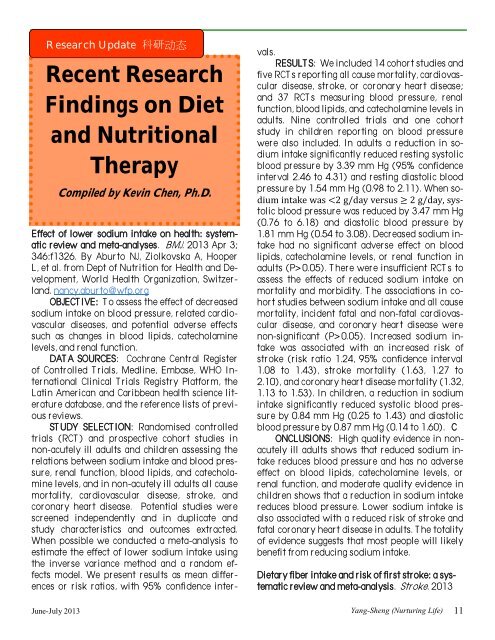You’ll start with a pill for blood sugar … then soonyou’ll need another pill for cholesterol … then anotherpill for high blood pressure … and theneven more pills for depression, neuropathy, andother problems triggered by blood sugar dise<strong>as</strong>e.Then, you’ll need insulin injections <strong>as</strong> well whenyou cross over in<strong>to</strong> full-blown diabetes.It’s not a pretty picture. And it’s made worse bythe fact that these drugs are ineffective, have sideeffects, and can even incre<strong>as</strong>e your risk for deathin some c<strong>as</strong>es.Rather than letting you fall in<strong>to</strong> this trap, TheBlood Sugar Solution helps you treat the underlyingroot causes of the condition. I want <strong>to</strong> helpyou cure your diabetes once and for all, not just“control” it!*The above w<strong>as</strong> taken with permission from Dr. Mark Hyman .Go <strong>to</strong> www.drhyman.com for additional information.On a personal note from Fiona Tobler, AssistantBusiness Manager, <strong>Yang</strong>-<strong>Sheng</strong>.com:Kevin Chen and I were fortunate enough <strong>to</strong> attenda lecture by Dr. Mark Hyman in May 2013 onhis latest book “Blood Sugar Solution.” The lecturew<strong>as</strong> eye-opening!The book “Blood Sugar Solution” includes real lifec<strong>as</strong>es of illness that were reversed by diet, lifestyle changes, and supplements. The book includesvarious “Ultra-Wellness Quizzes” thatmake you s<strong>to</strong>p and think, big time! The book recommendsdiet changes and nutritional supplements.One of the things I like best about thebook is that specific blood tests are recommended<strong>to</strong> see if you are on the path <strong>to</strong> poorhealth.The chapters are concise, the c<strong>as</strong>e studies arebrief, the descriptions of supplements and foodchoices are very clear – also, awesome recipes areincluded in the book.This book got my attention — while I am no<strong>to</strong>verweight and did rank low on almost all of the“UltraWellness Quizzes,” I got my big “AH-HA”moment when I <strong>to</strong>ok the quiz for food addiction.Oh my goodness, now I understand my addiction<strong>to</strong> sugar and am successfully on the path <strong>to</strong> dr<strong>as</strong>ticallyreduce my sugar in-take with the goal ofeliminating my desire for sugar al<strong>to</strong>gether. Atthis moment, I have no desire for SUGAR!I have bought two copies of this book already forgifts. I highly recommend this book for everyone!Mark Hyman, M.D. h<strong>as</strong> dedicated his career<strong>to</strong> identifying & addressing the rootcauses of chronic illness through agroundbreaking whole-systems medicineapproach known <strong>as</strong> FunctionalMedicine. He is a family physician, a sixtimeNew York Times bestselling author, and an internationallyrecognized leader in his field. Dr. Hyman strives <strong>to</strong>improve access <strong>to</strong> Functional Medicine, and <strong>to</strong> widen theunderstanding and practice of it, empowering others <strong>to</strong>s<strong>to</strong>p managing symp<strong>to</strong>ms and instead treat the underlyingcauses of illness through healthy eating and lifestyle. Getmore info about Dr. Hyman at http:// drhyman.comFiona enjoyed a fulfilling 34-year careerwith the Nuclear Regula<strong>to</strong>ry Commission<strong>as</strong> a Program Manager. For the l<strong>as</strong>tthree years, she h<strong>as</strong> been practicingqigong. Qigong played a key role in healinga back issue that had side-lined herfor a year from doing all the things sheloves: running, yoga, swimming andbiking. Back <strong>to</strong> an active life again, Fiona especially enjoyshiking with her precious pup, Marty! Fiona h<strong>as</strong> been a studen<strong>to</strong>f Buddhism for many years. She is certified in ReikiLevel II and h<strong>as</strong> experienced healing from this modelity <strong>as</strong>well. Fiona feels strongly that we should empower ourselves<strong>to</strong> be the best we can be and that we should walk innature every day!10 <strong>Yang</strong>-<strong>Sheng</strong> (Nurturing Life) Volume 3, Issue No. 3
Research Update 科 研 动 态Recent ResearchFindings on Dietand NutritionalTherapyCompiled by Kevin Chen, Ph.D.Effect of lower sodium intake on health: systematicreview and meta-analyses. BMJ. 2013 Apr 3;346:f1326. By Abur<strong>to</strong> NJ, Ziolkovska A, HooperL, et al. from Dept of Nutrition for Health and Development,World Health Organization, Switzerland.nancy.abur<strong>to</strong>@wfp.orgOBJECTIVE: To <strong>as</strong>sess the effect of decre<strong>as</strong>edsodium intake on blood pressure, related cardiov<strong>as</strong>culardise<strong>as</strong>es, and potential adverse effectssuch <strong>as</strong> changes in blood lipids, catecholaminelevels, and renal function.DATA SOURCES: Cochrane Central Registerof Controlled Trials, Medline, Emb<strong>as</strong>e, WHO InternationalClinical Trials Registry Platform, theLatin American and Caribbean health science literaturedatab<strong>as</strong>e, and the reference lists of previousreviews.STUDY SELECTION: Randomised controlledtrials (RCT) and prospective cohort studies innon-acutely ill adults and children <strong>as</strong>sessing therelations between sodium intake and blood pressure,renal function, blood lipids, and catecholaminelevels, and in non-acutely ill adults all causemortality, cardiov<strong>as</strong>cular dise<strong>as</strong>e, stroke, andcoronary heart dise<strong>as</strong>e. Potential studies werescreened independently and in duplicate andstudy characteristics and outcomes extracted.When possible we conducted a meta-analysis <strong>to</strong>estimate the effect of lower sodium intake usingthe inverse variance method and a random effectsmodel. We present results <strong>as</strong> mean differencesor risk ratios, with 95% confidence intervals.RESULTS: We included 14 cohort studies andfive RCTs reporting all cause mortality, cardiov<strong>as</strong>culardise<strong>as</strong>e, stroke, or coronary heart dise<strong>as</strong>e;and 37 RCTs me<strong>as</strong>uring blood pressure, renalfunction, blood lipids, and catecholamine levels inadults. Nine controlled trials and one cohortstudy in children reporting on blood pressurewere also included. In adults a reduction in sodiumintake significantly reduced resting sys<strong>to</strong>licblood pressure by 3.39 mm Hg (95% confidenceinterval 2.46 <strong>to</strong> 4.31) and resting di<strong>as</strong><strong>to</strong>lic bloodpressure by 1.54 mm Hg (0.98 <strong>to</strong> 2.11). When sodiumintake w<strong>as</strong> 0.05). There were insufficient RCTs <strong>to</strong><strong>as</strong>sess the effects of reduced sodium intake onmortality and morbidity. The <strong>as</strong>sociations in cohortstudies between sodium intake and all causemortality, incident fatal and non-fatal cardiov<strong>as</strong>culardise<strong>as</strong>e, and coronary heart dise<strong>as</strong>e werenon-significant (P>0.05). Incre<strong>as</strong>ed sodium intakew<strong>as</strong> <strong>as</strong>sociated with an incre<strong>as</strong>ed risk ofstroke (risk ratio 1.24, 95% confidence interval1.08 <strong>to</strong> 1.43), stroke mortality (1.63, 1.27 <strong>to</strong>2.10), and coronary heart dise<strong>as</strong>e mortality (1.32,1.13 <strong>to</strong> 1.53). In children, a reduction in sodiumintake significantly reduced sys<strong>to</strong>lic blood pressureby 0.84 mm Hg (0.25 <strong>to</strong> 1.43) and di<strong>as</strong><strong>to</strong>licblood pressure by 0.87 mm Hg (0.14 <strong>to</strong> 1.60). CONCLUSIONS: High quality evidence in nonacutelyill adults shows that reduced sodium intakereduces blood pressure and h<strong>as</strong> no adverseeffect on blood lipids, catecholamine levels, orrenal function, and moderate quality evidence inchildren shows that a reduction in sodium intakereduces blood pressure. Lower sodium intake isalso <strong>as</strong>sociated with a reduced risk of stroke andfatal coronary heart dise<strong>as</strong>e in adults. The <strong>to</strong>talityof evidence suggests that most people will likelybenefit from reducing sodium intake.Dietary fiber intake and risk of first stroke: a systematicreview and meta-analysis. Stroke. 2013June-July 2013 <strong>Yang</strong>-<strong>Sheng</strong> (Nurturing Life) 11
- Page 1 and 2: Cover should go hereDraft for Comme
- Page 3 and 4: Volume 3, No. 3 www.Yang-Sheng.com
- Page 8 and 9: is to smile from the heart, mind, b
- Page 12 and 13: May;44(5):1360-8. By Threapleton DE
- Page 14 and 15: cancer in the Health Professionals
- Page 16 and 17: decrease in BMI of 8% was the thres
- Page 18 and 19: Ancient Wisdom, Modern Kitchen 古
- Page 20 and 21: From The Doctor 医 生 之 窗Rais
- Page 22 and 23: way, make your food come alive in t
- Page 24 and 25: Meditation in Motion 动 中 冥
- Page 26 and 27: try shows that “Chronic “lifest
- Page 28 and 29: far from ideal: “I estimate I spe
- Page 30 and 31: neered the concept of self-care by
- Page 32 and 33: Book Review 书 评Book Review: Hea
- Page 34 and 35: more awakened and real to you if yo
- Page 36 and 37: Daoist Internal Alchemy 道 家 内
- Page 38 and 39: Qi Cultivation and Dao 炼 气 与
- Page 40 and 41: etween physician and patient, betwe
- Page 42 and 43: neutralize, and transform unhealthy
- Page 44 and 45: make a difference in outcomes. Chap
- Page 46 and 47: dary Yang Cheng Fu, mentioned the f
- Page 48 and 49: the senior students, a disciple of
- Page 50 and 51: Scientific Qi Exploration 气 的
- Page 52 and 53: flexor carpi radialis muscles, endi
- Page 54 and 55: dial end of the popliteal crease (f
- Page 56 and 57: yourself.This year’s Building Bri
- Page 58 and 59: ¼ cup goji berries2-3 fresh mint l
- Page 60 and 61:
from the plant's air channels. Lotu
- Page 62 and 63:
Yang-Sheng Needs Your Financial Sup













